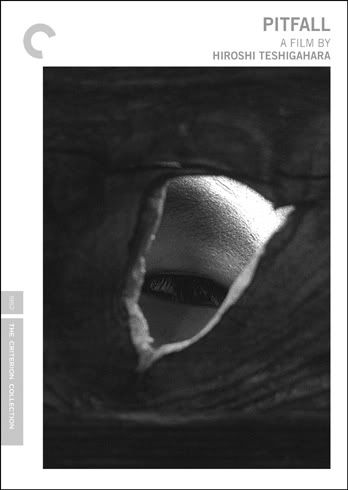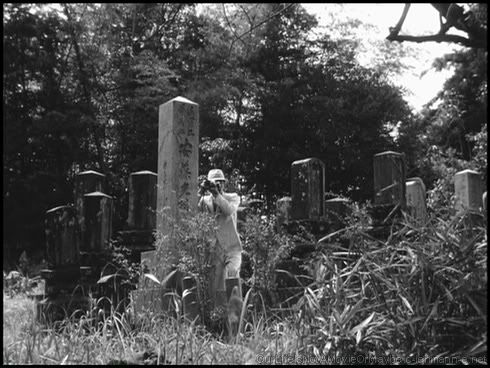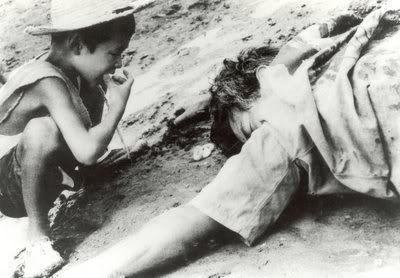The Pitfall

Title: The Pitfall (Otoshiana)
Rating: 4/5
Genre: Drama, Crime
Starring: Hisashi Igawa, Sumie Sasaki, Sen Yano
Director: Hiroshi Teshigahara
Author: Kôbô Abe
Language: Japanese
Release Date: 1962
Preface: A marriage between a philosophical poet and an experimental surrealist film maker, it is this combination that saw them release three thought provoking films across the span of four years, atmospheric and daring in their willing to push the boundaries of conventional cinema into avant-garde.
 Another impossible to classify film; a weird dramatic – almost documentary – political thriller with ghosts with a seemingly endless variety of points injected into this film to the point of bursting, perhaps slightly shakily exploring the boundaries between the social class and warning of the dangers of those in a position of power, deviously plotting to manipulate the situation to his liking. Tackling the declining coal mining industry and the difficulties many workers faced when looking for work, the demeaning conditions that led many to lose their lives for minimal pay, overseen by cruel men without care for those beneath them, this is one of those films that defy convention and stray well into the glories of obscurity.
Another impossible to classify film; a weird dramatic – almost documentary – political thriller with ghosts with a seemingly endless variety of points injected into this film to the point of bursting, perhaps slightly shakily exploring the boundaries between the social class and warning of the dangers of those in a position of power, deviously plotting to manipulate the situation to his liking. Tackling the declining coal mining industry and the difficulties many workers faced when looking for work, the demeaning conditions that led many to lose their lives for minimal pay, overseen by cruel men without care for those beneath them, this is one of those films that defy convention and stray well into the glories of obscurity. Opening with the young miner (Igawa) and his child struggling to look for work, traveling far to find another overseer willing to take him on, it isn’t long before he finds work once more. Interspersing documentary footage with his tale, blurring fact with fiction, he quickly becomes noticed by a mysterious figure, told to meet him near an abandoned mine amidst a town of ghosts only to be betrayed and brutally murdered. Rising as the dead he seeks the reason for his demise, becoming ensnared in a feud between look-a-like union leader (Yano) and a rival union, the manipulations of the assailant and the sole woman (Sasake) living in the desolate town layering a web of lies, the truth becoming ever more distorted through the deceit of others.
 The comparisons to the works of David Lynch (Eraserhead, Mulholland Drive) are easy enough to observe, particularly of note in the unusual fashion the story meanders from a simple tale of the working class to an observation of the dead, ghosts walking the land forced to endure the torture of life without impact on their surroundings. The plot thickening further as we become encapsulated by the mystery of the two feuding miner’s unions, the site manager dividing the two mines to fight amongst each other rather than uniting against him; its not just the story itself that has an unusual aimlessness about it, but there’s an indefinable purpose told through the sequence of eccentric scenes that on the surface are intriguing but are ultimately bizarre; the short scene of a boy skinning a frog, or the extensive footage of the miners torment as he drags his body through the sand standing out as examples.
The comparisons to the works of David Lynch (Eraserhead, Mulholland Drive) are easy enough to observe, particularly of note in the unusual fashion the story meanders from a simple tale of the working class to an observation of the dead, ghosts walking the land forced to endure the torture of life without impact on their surroundings. The plot thickening further as we become encapsulated by the mystery of the two feuding miner’s unions, the site manager dividing the two mines to fight amongst each other rather than uniting against him; its not just the story itself that has an unusual aimlessness about it, but there’s an indefinable purpose told through the sequence of eccentric scenes that on the surface are intriguing but are ultimately bizarre; the short scene of a boy skinning a frog, or the extensive footage of the miners torment as he drags his body through the sand standing out as examples.And yet the dialogue felt anything if not forthright, demonstrating clarity of each of the characters desires, feelings and emotions, aptly performed we can quickly come to terms with their stance and piece them into the ever widening puzzle of betrayal and manipulation, but like the great works of ‘Tennessee Williams’ (Streetcar Named Desire, Cat on a Hot Tin Roof, Glass Menagerie) or ‘John Steinbeck’ (Grapes of Wrath, Of Mice and Men), there is a definite sub-text to each word being carefully chosen, an additional intention by the director made apparent by the specific phrasing used, a moral waiting to be extrapolated from the story, assisted by one of the most obscure soundtracks I’ve ever heard utilised. Avant-Jazz of the most eclectic kind, ranging from complete silence to sudden and short loud bangs and knocks, or a rapid technical chaos of piano sporadically and unpredictably distributed throughout its two hour run time.
 I’m not going to lie, I know I didn’t understand everything he was trying to get across with one viewing; the significance of enigmatic man in white against the dirty background perhaps more than a simple division of status, behaving as a sort of ‘Grim Reaper’ handing out death with little plausible reason for doing so; the feud between the ‘old pit’ and the ‘new pit’ perhaps hinting at a futile war – not that war is ever anything but – between followers of the new and old testament; the small mute child viewing all like an oddly omnipotent traveler, watching everything unfold. But behind this existential meaning is another layer, showing the corruption of capitalism, those in power manipulating situations for their own benefit (or amusement), and of the mystery of death, the ghosts desperately searching for a reason for their untimely demise that will never become apparent. Despite some slight confusion, there is a point to be made here and whilst difficult to extract, is undeniably on show for the smart man to piece together.
I’m not going to lie, I know I didn’t understand everything he was trying to get across with one viewing; the significance of enigmatic man in white against the dirty background perhaps more than a simple division of status, behaving as a sort of ‘Grim Reaper’ handing out death with little plausible reason for doing so; the feud between the ‘old pit’ and the ‘new pit’ perhaps hinting at a futile war – not that war is ever anything but – between followers of the new and old testament; the small mute child viewing all like an oddly omnipotent traveler, watching everything unfold. But behind this existential meaning is another layer, showing the corruption of capitalism, those in power manipulating situations for their own benefit (or amusement), and of the mystery of death, the ghosts desperately searching for a reason for their untimely demise that will never become apparent. Despite some slight confusion, there is a point to be made here and whilst difficult to extract, is undeniably on show for the smart man to piece together. 
Comments
Post a Comment